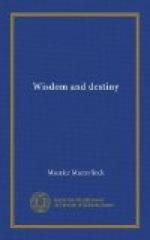up power when he feared that his glory was leading
his people astray—the happiness of these
will differ by far from that of some mean-souled,
venomous creature who might (if such a thing may be
assumed) by mere chance have discovered some extraordinary
natural law. Long is the road that leads from
the satisfied brain to the heart at rest, and only
such joys will nourish there as are proof against
winter’s storms. Happiness is a plant that
thrives far more readily in moral than in intellectual
life. Consciousness—the consciousness
of happiness, above all—will not choose
the intellect as a hiding-place for the treasure it
holds most dear. At times it would almost seem
as if all that is loftiest in intellect, fraught with
most comfort, is transformed into consciousness only
when passed through an act of virtue. It suffices
not to discover new truths in the world of thought
or of fact. For ourselves, a truth only lives
from the moment it modifies, purifies, sweetens something
we have in our soul. To be conscious of moral
improvement is of the essence of consciousness.
Some beings there are, of vigorous intellect, whose
intellect never is used to discover a fault, or foster
a feeling of charity. And this happens often with
women. In cases where a man and a woman have
equal intellectual power, the woman will always devote
far less of this power to acquiring moral self-knowledge.
And truly the intellect that aims not at consciousness
is but beating its wings in the void. Loss and
corruption needs must ensue if the force of our brain
be not at once gathered up in the purest vase of our
heart. Nor can such an intellect ever know happiness;
nay, it seems to invite misfortune. For intellect
may be of the loftiest, mightiest, and yet perhaps
never draw near unto joy; but in the soul that is gentle,
and pure, and good, sorrow cannot for ever abide.
And even though the boundary line between intellect
and consciousness be not always as clearly defined
as here we seem to assume, even though a beautiful
thought in itself may be often a goodly action—yet,
none the less will a beautiful thought, that springs
not from noble deed, or wherefrom noble deed shall
not spring, add but little unto our felicity; whereas
a good deed, though it father no thought, will ever
fall like soft bountiful rain on our knowledge of
happiness.
54. “How final must his farewell to happiness have been,” exclaims Renan, speaking of the renouncement of Marcus Aurelius—“how final must his farewell to happiness have been, for him to be capable of such excess! None will ever know how great was the suffering of that poor, stricken heart, or the bitterness the waxen brow concealed, calm always, and even smiling. It is true that the farewell to happiness is the beginning of wisdom, and the surest road to happiness. There is nothing sweeter than the return of joy that follows the renouncement of joy, as there is nothing more exquisite, of keener, deeper delight, than the enchantment of the disenchanted.”




